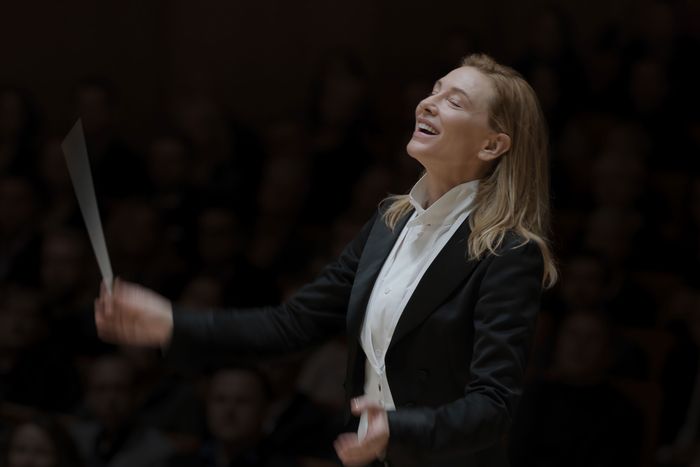
Cate Blanchett is getting some of the greatest accolades of her career for her new Venice Film Festival movie Tár. She reportedly received a six-minute standing ovation at the film’s world’s premiere. (At Venice, which is a lot more relaxed and less status-conscious than Cannes, that’s considered long.) “No one but Cate Blanchett could have delivered the imperious hauteur necessary for this engrossing movie from writer-director Todd Field,” said The Guardian’s Peter Bradshaw. “More otherworldly than Galadriel, more regal than Elizabeth, and more devilishly unrepressed than Carol Aird, Tár might just be the actor’s signature role,” mused Ben Croll at The Wrap. The actress “uses every aspect of her physicality — her costuming, her gestures, the styling of her hair — to embody the crescendos and diminuendos of this acerbic cautionary tale of genius and cruelty and towering, monstrous ego,” wrote Jessica Kiang at Sight and Sound. “A hydrogen bomb of a performance,” declared Jack King at The Playlist. “Tár marks yet another career peak for Blanchett — many are likely to argue her greatest,” gushed David Rooney at The Hollywood Reporter. And Variety’s Owen Gleiberman echoed many when he foretold that Blanchett’s performance is “destined to make her a major presence in this year’s awards season.”
The actress will continue to get reviews like this throughout awards season, because they’re basically correct. Blanchett is sensational in Field’s film, playing Lydia Tár, the brilliant, imperious chief conductor of the Berlin Philharmonic. She has to be sensational: The whole movie has been built around this character, whom we’re told is not just a pioneering figure in the classical music world but a genuine international celebrity. (The script was reportedly written specifically with Blanchett in mind.)
It’s actually a somewhat risky endeavor. Blanchett’s performance requires us to buy into the mystique surrounding this woman. It also requires us to remain fascinated with her as that mystique is slowly destroyed, as whispers and allegations begin to surface about the way that Lydia has been using some of her prettier, younger underlings. Because the camera is fixed remorselessly on her, the destruction has to happen without Blanchett ever losing the ability to command our complete attention. What’s truly striking about her performance is that once the movie is over, it’s hard to conceive of a world where Lydia Tár doesn’t exist. I predict memes.
Field’s film follows Lydia as she does a fawning New Yorker Festival Q&A (with Adam Gopnik playing himself), prepares for the publication of her hot new memoir, rehearses for a performance of Mahler’s Fifth Symphony, deals with backroom bureaucracy at the Philharmonic, and begins to worry about the strange messages being sent her way by a former protégé and paramour. Lydia lives with her emotionally fragile wife (and first violin), Sharon (Nina Hoss), and their young daughter, but she spends most of her time traveling with her doting and loyal assistant, Francesca (a terrifically restrained Noémie Merlant, whose almost invisible energy serves as a convincing yin to Lydia’s always-present yang). We can see the seductive power of Lydia’s celebrity. One admirer comes onto her at a meet-and-greet early in the film, and Francesca is on the case immediately, for both professional and perhaps personal reasons.
Lydia is a supernaturally charismatic protagonist, the kind fiction often imagines but the real world rarely presents. Is she also a monster? The picture is fairly nuanced in its portrayal of the way that power dynamics work in this industry. But it also obfuscates; we are told about things Lydia has done that we don’t actually see. We do, however, sense them — which is an interesting position to put us in as viewers, since the film spends all of its time with Lydia. So, whose point of view are we seeing? If it’s Lydia’s, is the fact that so many of these transgressions are hidden from view meant to suggest that she herself is living in denial? Or is it just a cop-out on the film’s part?
Field hasn’t directed a feature film since 2006’s Little Children, and this is only his third time behind the camera. All of his movies have been admirable, and absorbing, and thoughtful, and well-acted. They’ve also been — forgive me — a bit gray and predictable. We know where Tár is headed from pretty much its opening scenes, but that doesn’t mean that the film shouldn’t still surprise and shock us.
Luckily, this is where Blanchett comes in, turning the movie from a moderately interesting and topical one into something quite beautiful. She brings the energy and the sensation that much of the rest of the film lacks. The poster for Tár shows her character with arms outstretched, the body contorted, as if in the middle of conducting a particularly powerful piece of music. Much is made throughout of Lydia’s flamboyant, dramatic style of conducting. And while we do see snippets of her at work, the film anticipates some big conducting moment — an extended orchestral set piece, perhaps. That moment does come, though not in quite the way that we expected. We want to see Tár, but Tár has some cruel fun denying us that. To Field’s credit, he gives Blanchett the baton, and she delivers masterfully.
More From Venice
- A Minute-By-Minute Breakdown of The Brutalist
- This Is Not Angelina Jolie’s Big Comeback
- How to Bet on Oscar Season


